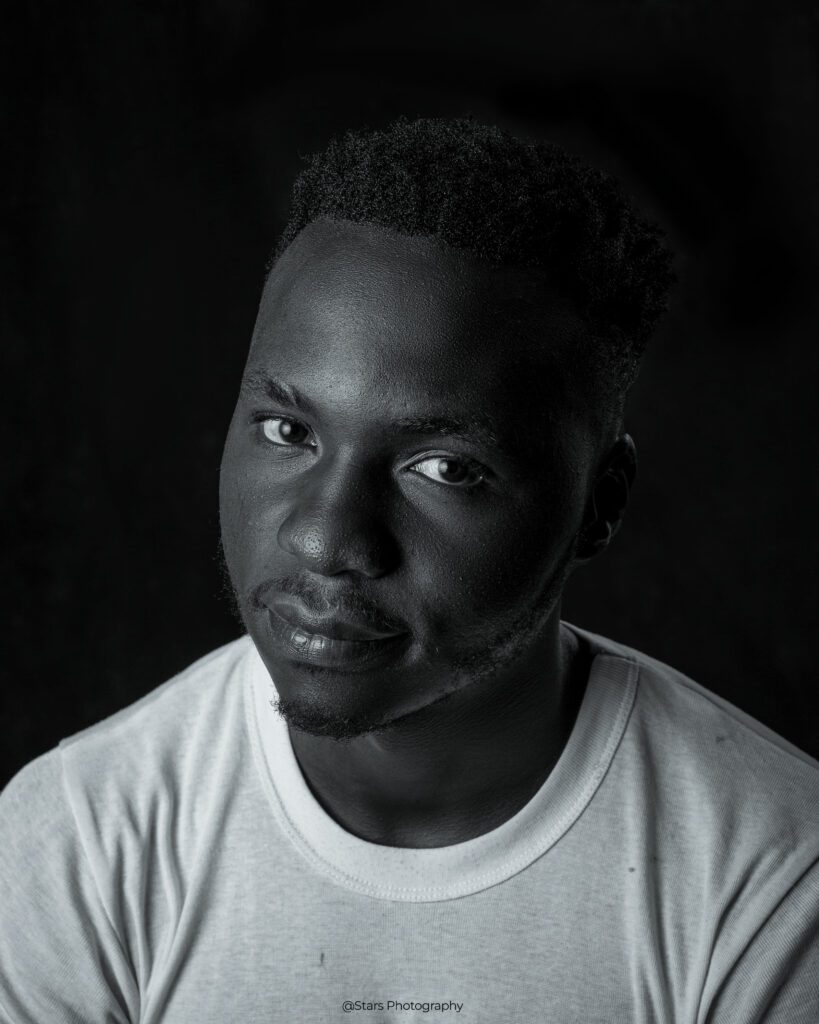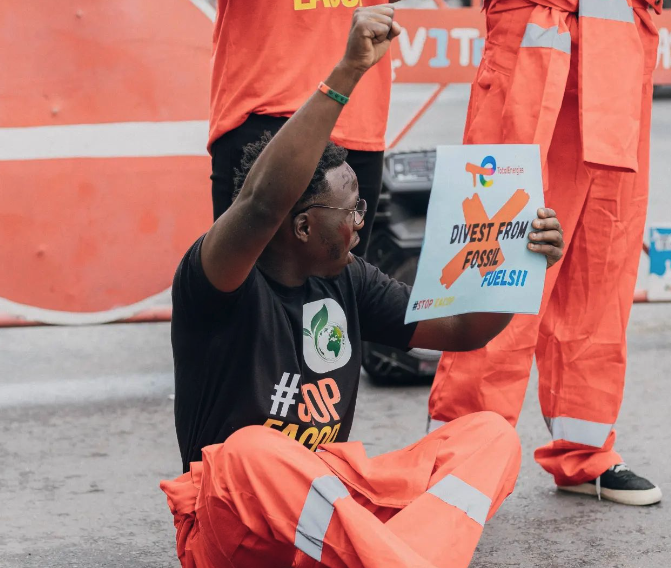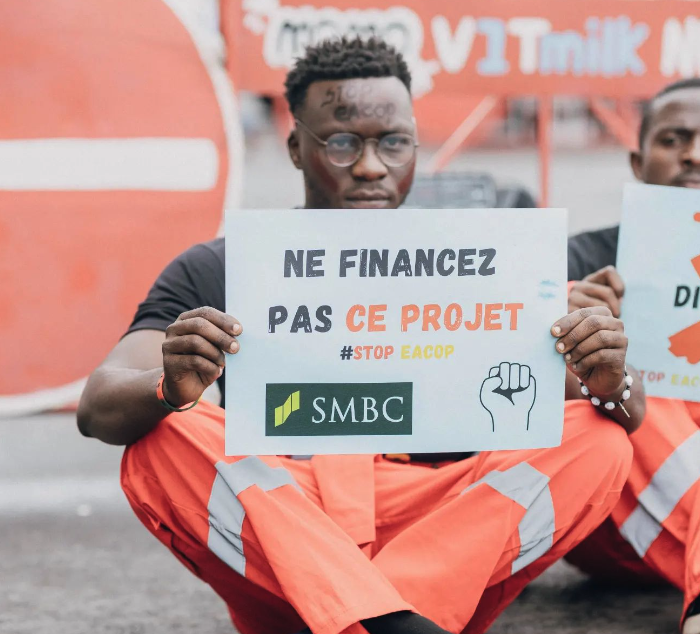Conversations with an Environmental Trailblazer
As part of our endeavour to acquire a first-hand viewpoint of what is going on in the field and beyond solely data and figures, United Rising has decided to directly contact locals who are aware and have direct involvement in educating locals on environmental practices and rights. In this manner, we had the opportunity to gain a more comprehensive understanding of how sustainability is conceptualized and operates in regions that are profoundly impacted by the effects of climate change. In the present case, we had the chance to get in touch with Germain Dartagnan – an environmental activist from Goma, Congo, founder of Climate Education.
We had the great pleasure of interviewing him, an individual with a staggering approach to education and spreading awareness on environmental issues. Before finding out how he does it, let’s find out who he is.

Who is Germain?
Germain is an enthusiastic young man whose passion for protecting the environment began* really early in his life. He always felt a strong connection to nature, even as a child. Back then, he got motivated to become Mother Nature’s guardian by watching the anime cartoon “Naruto” – the famous Japanese manga series written and illustrated by Masashi Kishimoto. The story of the main character has inspired young Germain to be resilient in life; as well as how important trees are and their preservation alike. According to him, this is a matter that he was not educated about in school and which was eye-opening for his young self.
According to Germain, it’s increasingly rare to see the youth being involved in environmental issues in Congo. Above being one of the exceptional young men dedicated to environmentalism, he is as well an actor and stand-up comedian. Witnessing how young people are growing less concerned about mother nature had determined him to try and relate to them through comedy. He always has a green theme on his podiums that symbolically accompany him. He affirms that his shows are opportune moments through which he also educates people on various matters and brings issues to public attention – here, he also makes his audience consider their individual active roles in protecting nature.
Even though his methods come by as controversial to some of his compatriots, Germain’s performances touch people’s hearts and consciences, which is exactly what he desires most: to spread the message and have a direct impact on the population. Indeed, during our interview, he repeatedly affirmed that comedy is what enables him to reach wider audiences to whom he can engage and educate on climate issues.
What might come across as intriguing and odd to some people in his community is precisely what makes Germain a pioneer in this field in Congo; an innovator in methods of creating awareness and educating people on environmental matters!
The Reality of Cobalt Mining
United Rising recently conducted a study on the Cobalt issue in the Democratic Republic of Congo – a phenomenon that has recently raised the attention of the entire world. We presented profoundly distressing imagery from the operational artisanal mining sites distressing imagery from the operational artisanal mining sites that operate there. This reality compelled us to escalate our investigative efforts. Therefore, we sought the insights of locals who might’ve witnessed these events first-hand, to get a real touch of what is going on down in Congo. Our ultimate goal was to get testimonies that would either confirm or disapprove of the mispractices that we have identified during our research and to dig deeper into locals’ perspectives on the matter.
To start confronting this topic, we first enquired Germain on what is is the reality of the labour practices that make Cobalt artisanal mines so malicious. Let’s hear him out!
“Cobalt is one of the most devastating issues in the Congo, but it seems to be the least talked about. Although I haven’t had the opportunity to see for myself what’s going on in the cobalt mines, I did have the chance to discuss the situation in detail with a friend who has first-hand experience on the ground.
The situation of the children is the one that touches me the most, and child exploitation is a real and terrible reality in the cobalt mines. In Kolwezi, children bear the heaviest burdens. Children as young as 7 are exposed to constant danger when they should be at school. In addition, many pregnant women are also present on the site, putting their health at risk. Workers spend hours working barehanded in the mines, without any protection or equipment – sometimes to a depth of 60 meters. They breathe in toxic dust and, unfortunately, many fatal accidents occur due to the numerous cave-ins.”
Germain then confirms that labour malpractices are also the case with industrial mines:
“In 2019, we experienced a serious accident with 40 artisanal miners losing their lives in a single collapsed tunnel in Kolwezi, in a mine operated by Kamoto Copper Company, part of Glencore, which claims to be a responsible company.
“The majority of cobalt mining continues in the DRC, despite the fact that we are a very precarious country. It is truly shocking to note that despite the importance of cobalt extraction, there are no rules, controls or effective monitoring to regulate this activity. The lack of regulation has devastating consequences for our environment and our people.”
Are there efforts to regulate this activity?
We then asked Germain how this increasing demand for Cobalt is affecting the local communities; and if enough efforts are being made to ensure fair compensation to them, and ensure their well-being. His answers reveal far more and deeper ramifications of the harmful effects that cobalt mining has on Congolese communities!
“Cobalt mining has a considerable overall impact. First of all, mining dust causes many cases of lung disease. Moreover, these dust particles have an impact on the whole country, as they are deposited in the waters of the Congo River, which crosses the entire territory. This affects soil irrigation, fishing and agriculture in general. What’s more, to make way for the mines, deforestation is also required, leading to the destruction of sensitive natural ecosystems.
When people talk about fair compensation, I don’t really see it happening. What I do see is that, once again, our resources, such as gold, zinc, coltan and cobalt, are being exploited, and the lungs of the Congo are the ones suffering the consequences of this. The problem is compounded when we see local organizations coming to the aid of the victims of this exploitation, but ending up entering and participating in mining industry circles, thus contributing to the illegal cobalt trade.”
We further discussed the efforts that are put in place to reduce malpractice in this sector and asked him how effective they are on the field. Here Germain reveals a grim truth by comparing what should happen as it is on paper, and what truly happens in practice.
“This question can be addressed by examining what should happen in principle and what actually happens on the ground. Normally, international companies should be obliged to have due diligence standards and procedures for respecting human rights, thus offering a minimum level of dignity in the workplace and seeking to prevent incidents and exploitation of workers’ physical integrity. The problem takes on a greater dimension when we see the inaction of the international community to challenge the deeper structural problems of exploitation. What we see here is a superficial, bureaucratic approach that doesn’t really translate into action on the ground. This is a systematic problem that needs to be tackled at its roots, in order to put in place concrete measures that emphasize corporate accountability.
The mines are in rather remote areas of the country, so the locals live with the damage caused by the mines without really realizing that it comes from the exploitation of cobalt – here in the capital, it’s something you don’t hear much about. As far as the miners are concerned, there’s a general “I had enough!” because human beings are completely dehumanized and discouraged. As I mentioned, the worst happens when we see the so-called “humanitarian” organizations, which are corrupt and part of the problem, exploiting their own inhabitants. Their influence is limited and often more negative.”
During our research, we found out that in Kolwezi, a region with multiple industrial and artisanal Cobalt mines, there are solely 2 inspectors appointed to confront various issues that are going on in both kinds of enterprises. Germain’s reaction to finding this out reveals another harsh reality:
“This doesn’t surprise me, as I’m well aware of the fact that there is total inefficiency in terms of controls and monitoring in the mines, even in the cobalt capital of the world, Kolwezi. I repeat, my contacts in the Kolwezi region have confirmed multiple cases where the inspectors themselves have been compromised because they were involved in the illegal cobalt trade. We desperately need a proportional social inspection to guarantee a minimum of safety for miners, as well as an environmental inspection to minimize damage to an ecosystem essential to our survival.”
What are the underlying interests of this activity?
We were deeply intrigued to gain insight into Germain’s perspective regarding the political and economic interests underlying this activity, which has been causing significant distress to the local domestic system and the lives of locals. Germain’s response resonated profoundly with us, as it brought to light a multitude of long-held taboos that still remain largely unspoken.
“Admittedly, there are political and economic interests at stake, mainly on the part of the stakeholders who decide and negotiate what “interests” are, claiming to meet the needs of the population. However, it’s obvious that we’re only talking about a part of the world’s population, a class that continues to appropriate the resources of countries like the Congo. The plundering of resources continues, and this is not just an injustice in terms of resources but also jeopardizes the country’s opportunities for peace, security, stability and development. It’s systematic exploitation that is perpetuated mainly on the continent itself, which is increasingly plagued by corruption – take, for example, illicit cobalt exports between the DRC and Zambia. Everyone has their own interests, but the interests of the population are completely neglected!
As far as consumers are concerned, when European countries or the United States buy iPhones or Teslas, it’s important to realize that these objects don’t necessarily make you a better person – behind this pride, we must remember that there is the blood of the innocent, of children who are sacrificed for what you call an ecological and just transition. I want this message to be spread because it’s important to know that there are real sacrifices and injustices being perpetrated to meet what you consider “your needs”. It’s time for awareness to rise.
I am deeply moved by the cause of children, and I see how all these dynamics push them to join rebel groups because of unemployment. It’s also part of the political interests of the countries around the DRC, which fund rebel groups to recruit Congolese youth to fight against their own country! All this adds up to political tension and insecurity, in which the exploitation of resources continues for economic interests outside the DRC.”
Worrying facts of the disastrous effects that Cobalt mining inflicts on both the environment and locals of Congo are being confirmed by Germain, and intensified by his statements that disclose an even more aggravating face of this problem – international-level ignorance towards this problem and even local government involvement in the exploitation of indigenous people, through corruption. Germain stresses the importance of tackling this problem with great urgency and shows the irreversible, horrifying effects of malpractice in the Cobalt mining sector.
STOP EACOP


During our initial discussion with Germain, we found out that he is actively involved in a project worth advertising to our audience. EACOP (East African Oil Pipeline) is a TotalEnergies project to create the world’s largest heated oil pipeline – 1443 km long, 30 m wide – which will go across many districts and natural landscapes in both North Uganda and Tanzania.
“EACOP is a devastating project that will cause irreversible damage to the ecosystem. Indeed, it represents another form of modern colonialism. Despite the great promises, there is already a great deal of pressure on the local populations, with flagrant violations of the property and land rights of the locals, who use this land for vital activities such as agriculture, which is necessary for their survival. It is quite clear that Total’s actions are in total contradiction with the declarations and promises of respect to which the multinational has publicly committed itself.
Total’s claims about enhancing the local economy and creating jobs are just diversionary tactics, while African representatives succumb to these policies. This is another form of colonization, this time through corporations. We are already witnessing land cession based on disproportionate compensation, putting local people in a precarious situation. The agreements have already been made, and the people are simply suffering the consequences.
Obviously, one of the most alarming issues will be the environmental and climatic impacts of this project. We’re talking here about protected natural reserves that will be completely devastated. These rich and sensitive ecosystems will be irreversibly altered. Eacop is a climate bomb, as the project will generate up to 34.3 million tonnes of CO2 per year – far more than the combined emissions of Uganda and Tanzania. We’re a long way from meeting the environmental targets set by the international community.”
Key Challenges as an Activist
Germain is heavily engaged in the battle against this project, actively showcasing his resistance across various platforms. While he ardently presents his fight, it’s evident that these endeavours come with great challenges. Thus, we asked Germain what are the main challenges that activists such as himself face in stopping this colossal project and what are their odds against the large interests at stake:
“The most obvious obstacles are the violence that young activists suffer at the hands of local authorities. Many young people in Uganda have been systematically beaten and illegally detained. As activists, we tell the truth, but a large part of this planet isn’t really ready to hear it, so it’s easier to keep quiet than to really question these actions of revolt. This even affects the people involved, like a large proportion of the people in Uganda and Tanzania, who don’t want to revolt for fear of the authorities. Our efforts have also paid off, to some extent, because as activists we have focused on divestment to hit Total’s wallet, which needs 9 billion euros for this project. Thanks to our constant activism, we managed to block the support of 25 banks that were financing EACOP”
However, what was not mentioned is that, unfortunately, 12 of these banks that “stopped” ultimately made a loan to Total – thus allowing the project to continue.
UR’s opportunity to amplify marginalized voices
Conducting an interview with Germain offered us a unique opportunity to delve into realities that frequently remain silenced. It is paramount to amplify the voices of marginalized communities that bear the brunt of our collective decisions and policies.
Germain’s words serve as a testament to the facade of sustainability often presented to us—a mere green catchphrase frequently manipulated to serve the profit-driven and capitalistic expansion of the global north. The policies upholding these trends inflict extensive harm and fail to recognize sustainability as an interconnected and comprehensive principle.
Throughout our interview, he also delved into topics such as the pivotal role of indigenous communities as custodians of ecosystems and the crucial influence of education. In alignment with our mission to illuminate the concept of intersectionality, we eagerly anticipate sharing insights on this matter and examining how it manifests within the context of the situation in Congo.